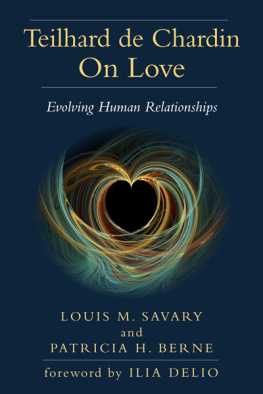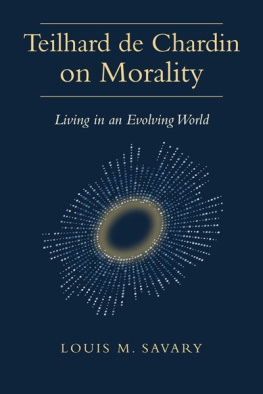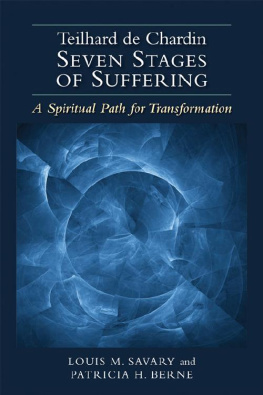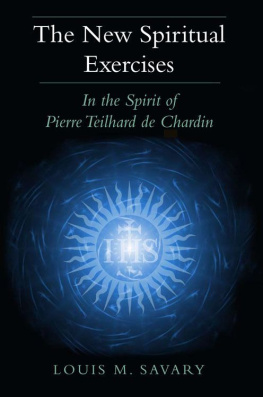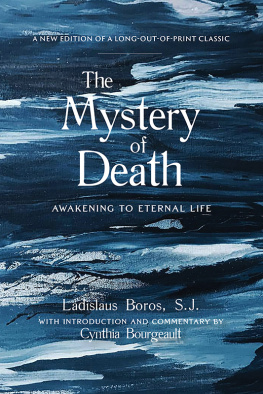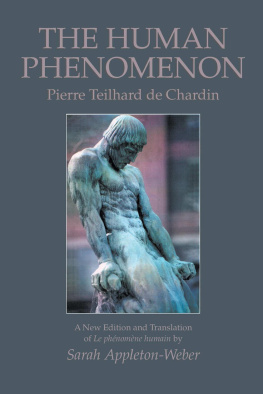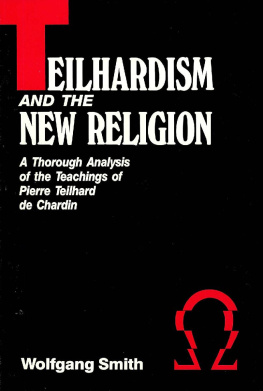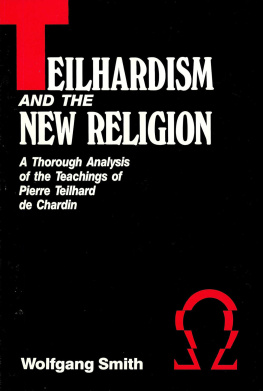Louis M. Savary - Teilhard de Chardin On Love: Evolving Human Relationships
Here you can read online Louis M. Savary - Teilhard de Chardin On Love: Evolving Human Relationships full text of the book (entire story) in english for free. Download pdf and epub, get meaning, cover and reviews about this ebook. year: 2017, publisher: Paulist Press, genre: Religion. Description of the work, (preface) as well as reviews are available. Best literature library LitArk.com created for fans of good reading and offers a wide selection of genres:
Romance novel
Science fiction
Adventure
Detective
Science
History
Home and family
Prose
Art
Politics
Computer
Non-fiction
Religion
Business
Children
Humor
Choose a favorite category and find really read worthwhile books. Enjoy immersion in the world of imagination, feel the emotions of the characters or learn something new for yourself, make an fascinating discovery.
- Book:Teilhard de Chardin On Love: Evolving Human Relationships
- Author:
- Publisher:Paulist Press
- Genre:
- Year:2017
- Rating:4 / 5
- Favourites:Add to favourites
- Your mark:
- 80
- 1
- 2
- 3
- 4
- 5
Teilhard de Chardin On Love: Evolving Human Relationships: summary, description and annotation
We offer to read an annotation, description, summary or preface (depends on what the author of the book "Teilhard de Chardin On Love: Evolving Human Relationships" wrote himself). If you haven't found the necessary information about the book — write in the comments, we will try to find it.
Teilhard de Chardin On Love: Evolving Human Relationships — read online for free the complete book (whole text) full work
Below is the text of the book, divided by pages. System saving the place of the last page read, allows you to conveniently read the book "Teilhard de Chardin On Love: Evolving Human Relationships" online for free, without having to search again every time where you left off. Put a bookmark, and you can go to the page where you finished reading at any time.
Font size:
Interval:
Bookmark:
Louis M. Savary and Patricia H. Berne
Foreword by Ilia Delio

Paulist Press
New York / Mahwah, NJ
The Scripture quotations contained herein are from the New Revised Standard Version: Catholic Edition, Copyright 1989 and 1993, by the Division of Christian Education of the National Council of the Churches of Christ in the United States of America. Used by permission. All rights reserved.
Cover image by ScrappinStacy / Bigstock.com
Cover and book design by Lynn Else
Copyright 2017 by Louis M. Savary and Patricia H. Berne
All rights reserved. No part of this publication may be reproduced, stored in a retrieval system, or transmitted in any form or by any means, electronic, mechanical, photocopying, recording, scanning, or otherwise, except as permitted under Section 107 or 108 of the 1976 United States Copyright Act, without the prior written permission of the Publisher. Requests to the Publisher for permission should be addressed to the Permissions Department, Paulist Press, 997 Macarthur Boulevard, Mahwah, NJ 07430, (201) 825-7300, fax (201) 825-8345, or online at www.paulistpress.com.
Library of Congress Cataloging-in-Publication Data
Names: Savary, Louis M., author. | Berne, Patricia H., author.
Title: Teilhard de Chardin on love : evolving human relationships / Louis M. Savary and Patricia H. Berne ; foreword by Ilia Delio.
Description: New York ; Mahwah, NJ : Paulist Press, 2017. | Includes index.
Identifiers: LCCN 2016026700 (print) | LCCN 2016038607 (ebook) | ISBN 9780809153220 (pbk. : alk. paper) | ISBN 9781587686634 (Ebook)
Subjects: LCSH: Teilhard de Chardin, Pierre. | Love. | Interpersonal relations. | LoveReligious aspectsChristianity. | Interpersonal relationsReligious aspectsChristianity.
Classification: LCC B2430.T374 S275 2017 (print) | LCC B2430.T374 (ebook) | DDC 177/.7092dc23
LC record available at https://lccn.loc.gov/2016026700
ISBN 978-0-8091-5322-0 (paperback)
ISBN 978-1-58768-663-4 (e-book)
Produced by Paulist Press
997 Macarthur Boulevard
Mahwah, New Jersey 07430
www.paulistpress.com
Printed and bound in the
United States of America
The day will come when,
after harnessing space, winds, the tide and gravitation,
we shall harness for God the energies of love.
And, on that day,
for the second time in the history of the world,
man will have discovered fire.
Pierre Teilhard de Chardin, SJ
I N THE MIDDLE AGES, the great scholastic theologians debated whether Gods essence was being or goodness. The Dominican school, following Thomas Aquinas, argued for essential being while the Franciscan school, following Bonaventure, claimed that God was essentially good. The import of this debate was far-reaching, since understanding the nature of God influenced everything from how God acted to the role of God in creation and human destiny. One of the major questions in the thirteenth century centered on the nature of God: Did God create according to divine will or divine freedom? The Franciscan school, in particular, placed the emphasis on divine will, since in the New Testament God is revealed as good: No one is good but God alone (Luke 18:19). Medieval scholars defined love as the highest good, since love goes out of itself toward another for the sake of the other. Love is what God is, as we read in the New Testament: God is love (1 John 4:8, emphasis mine). The emphasis on love marked Franciscan theology, as well as the theology of the Victorines and Cistercians, who preceded the Franciscans and influenced them. Bernard of Clairvaux taught that love and knowledge were intertwined, amor ipse notitia est, and his teaching was influential on the School of Chartres, where the Canons of St. Victor developed a sophisticated understanding of cosmology, theology, and the mechanical arts along the lines of the platonic cosmos and the essential role of love.
Love fell off the radar with the rise of modern science and took a turn for the worse in the modern age. The history of modernity and the rise of modern philosophy can be interpreted as the death of love in the cosmos. Modern knowledge was based on the turn to the subject and the power of knowledge. Love turned inward and became associated with feelings and the emotional life while knowledge was expressed in the will to power. However, in the twentieth century, Pierre Teilhard de Love draws together and unites; in uniting, it differentiates. Love is the core energy of evolution.
Taking a position highly consonant with Franciscan theology, Teilhard began to develop a philosophy of love. His ideas are closely related to the fourteenth-century Franciscan theologian, Duns Scotus, who wrote on univocity, individuation, and the primacy of Christ, all grounded in a core doctrine of love. Teilhards ideas take their immediate impetus, however, from modern physics where relativity, mass-energy equivalence, and wave-particle duality gave him a new understanding of nature and the inherent interconnectivity of nature. Reflecting on the primacy of love-energy in evolution, he wrote that union precedes being because love is the core energy of evolution and love is intrinsically relational: What comes first in the world for our thought is not being but the union which produces this being. Teilhards philosophy of love is thoroughly consonant with our interconnected universe, as science now understands it. He emphasized union-in-love as core constitutive existence. To be is to be self-gift. Isolated existences, even on the molecular level, give themselves up for greater union. Hence, unitive being is relational and always toward more being. On the level of evolution, Teilhard claimed, life is constantly directed toward more life and ultimately toward a future fullness of life, or better yet, a future fullness of unity in love.
The implications of Teilhards philosophy of love are enormous for evolving life because how we understand nature, creation, humanity, and God impacts our values and choices. Lou Savary and Patricia Berne have provided a valuable contribution in this book by clearly explaining Teilhards doctrine of love on every level of life, from God to friendship, marriage, parenting, and human community. Their book is less a scholarly exposition on a Teilhardian doctrine of love than a masterful illumination of love as the core energy of evolving life. Each chapter clearly explains Teilhards insights and then provides practical ways of incorporating these ideas into daily life. I think Teilhard would have been very pleased with this book because he struggled throughout his life to make his ideas clear and cogent. Lou and Patricia have followed Teilhards dreamto make known to the world the power of love.
Love is the energy that can transform the darkness of our age into the light of hope by empowering us to work toward a future fullness of life together. How we love is how we live, and who we love shapes our relationships, communities, our connection to the Earth, and the future of the Earth. We are, in the most basic sense, the sum of our loves. Teilhards philosophy of love borne out in the evolution of God, self, and future Earth is a vital doctrine for our time. It awakens us to the essential goodness at the heart of all life and kindles within us the desire to work toward a more unified world. We are born out of love, we exist in love, and we are created for the fullness of love. It is time to change our focus from knowledge to love, letting go of the need for power and control and recognizing our intrinsic need for others. Lou and Patricias book invites us to shift our horizon of life, for in the evening of life we will be judged on love alone.
Font size:
Interval:
Bookmark:
Similar books «Teilhard de Chardin On Love: Evolving Human Relationships»
Look at similar books to Teilhard de Chardin On Love: Evolving Human Relationships. We have selected literature similar in name and meaning in the hope of providing readers with more options to find new, interesting, not yet read works.
Discussion, reviews of the book Teilhard de Chardin On Love: Evolving Human Relationships and just readers' own opinions. Leave your comments, write what you think about the work, its meaning or the main characters. Specify what exactly you liked and what you didn't like, and why you think so.

